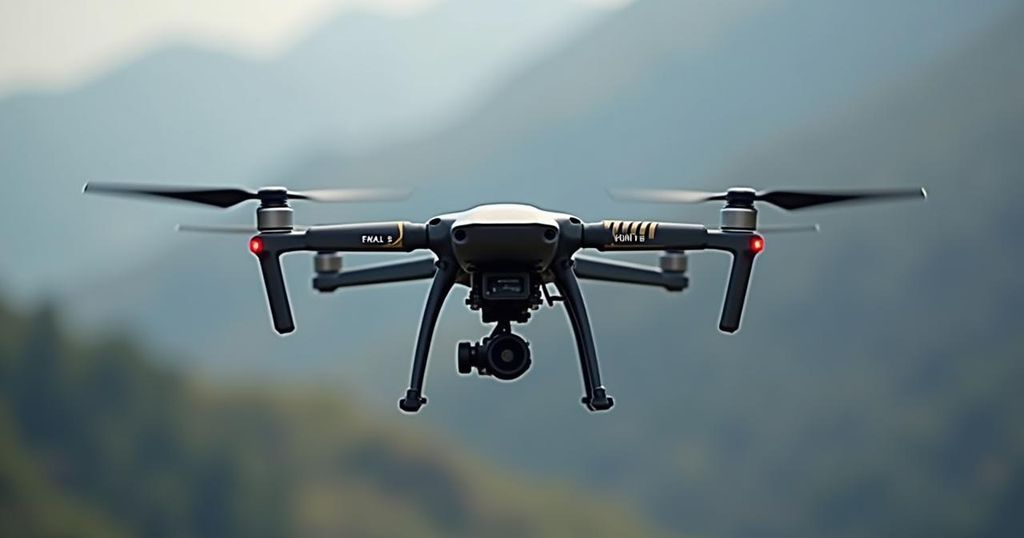Albania Secures Kamikaze Drones from Turkey Amid Strengthening Bilateral Ties
Albania is to receive a considerable number of kamikaze drones from Turkey, as stated by Prime Minister Edi Rama during President Erdogan’s visit. This military enhancement is contextualized within regional military upgrades post-Russia’s invasion of Ukraine. Erdogan additionally inaugurated the Namazgah mosque in Tirana, emphasizing strong bilateral ties and strategic cooperation in various sectors.
Albania is set to enhance its military capabilities following Prime Minister Edi Rama’s announcement that Turkey will supply a significant quantity of kamikaze drones. During a joint press conference that coincided with Turkish President Recep Tayyip Erdogan’s brief visit to Albania, Rama characterized the provision as a symbol of Turkey’s commitment to Albania’s security. He remarked, “It is a present that comes as a strong message from the Republic of Turkey that Albania is unhittable.” Kamikaze drones, which are also known as loitering munitions, are designed to approach their targets before crashing and detonating upon impact. Although the exact number and specifications of the drones were not disclosed, Rama clarified that their acquisition does not imply any aggressive intentions on Albania’s part. The move to bolster military resources is part of a broader regional trend among Western Balkan nations, prompted by geopolitical tensions following Russia’s invasion of Ukraine in 2022. Both Albania and Turkey are NATO allies, and Albania has previously acquired Bayraktar drones from Turkey. Furthermore, the occasion marked Erdogan’s inauguration of the Namazgah mosque in Tirana, a prominent Turkish-funded project showcasing the strengthening bilateral relations through cooperation in religious, agricultural, and educational sectors. Erdogan emphasized the potential for increased economic collaboration, aiming to double annual trade between the two nations to €2 billion. He also addressed regional concerns, criticizing Israel’s actions in Gaza as “genocide” and advocating for an urgent ceasefire to enable humanitarian assistance. Rama echoed a call for peace but noted that groups like Hamas should not be part of a peaceful resolution. The Namazgah mosque, which commenced construction in 2015 with an investment of approximately €30 million, is regarded as one of the largest mosques in the Balkans, featuring 50-meter-high minarets and a capacity to accommodate 8,000 worshippers. Its establishment reflects a significant Turkish cultural presence in Albania, which has a diverse religious landscape characterized by Sunni Muslims, Bektashi Muslims, and various Christian denominations coexisting harmoniously.
The recent announcement regarding Albania’s acquisition of kamikaze drones from Turkey underscores the evolving military dynamics in Eastern Europe, particularly in light of heightened security concerns after Russia’s aggressive maneuvers in Ukraine. Countries in the Western Balkans are modernizing their military capabilities to deter potential threats. Albania’s strategic relationship with Turkey, a fellow NATO member, further solidifies collaborative defense initiatives. Additionally, the inauguration of the Namazgah mosque reflects Turkey’s investment in cultural diplomacy, reinforcing ties between the two nations. The mosque serves as a cultural and religious hub, emphasizing the shared connections and cooperative spirit between Albanian and Turkish communities.
In conclusion, Albania’s decision to acquire kamikaze drones from Turkey highlights its proactive approach to national defense amidst regional uncertainties. The partnership with Turkey not only aims to enhance military strength but also fosters cultural and economic ties, as demonstrated by the inauguration of the Namazgah mosque. Prime Minister Rama’s assurances regarding Albania’s peaceful intentions alongside Erdogan’s advocacy for humanitarian aid in conflict zones reflect a balanced diplomatic posture as both nations navigate complex geopolitical landscapes.
Original Source: www.ekathimerini.com




Post Comment